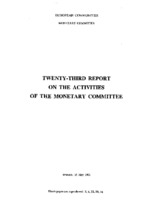Twenty-third Report on the Activities of the Monetary Committee.

EU Other
Συγγραφέας
EU Commission
Ημερομηνία
1982-05-15Προβολή/
Θεματικές επικεφαλίδες
Monetary Policy and Developments ; Economic AffairsΠερίληψη
World economic trends in 1981 were subject to a number of unfavourable influences:the aftermath of the second oil shock of 1980; the worsening of domestically generatedimbalances (in particular budgetary imbalances); wide and sometimes erratic swings ininterest rates and exchange rate relationships with the United States dollar. The effects ofthese factors on the economies of the major country groupings varied, but on balanceactivity may have picked up slightly in the course of 1981. The volume of world traderemained at the same level as in 1980, since the volume of imports by members of theOrganization of Petroleum Exporting Countries continued to offset to some extent the lowlevel of other countries' imports, which was accounted for by a marked slowdown inconsumption and importation of oil. The imports of the non-oil developing countrieswhich have large external deficits to finance, increased at a slower rate in 1981. The oil-producing countries' surpluses on current account decreased in 1981, after almost doublingfrom 1979 to 1980. The industrialized countries recorded an aggregate deficit, although theoverall picture masks sharp individual differences.
Γλώσσα
ΑγγλικάΣημείωση
Blank pages not reproduced: 2, 12, 20, 24CB-35-82-522-EN-C
